Harry Smith
Burton Grammar School Master (Mathematics 1949-1953, 1958-1979)
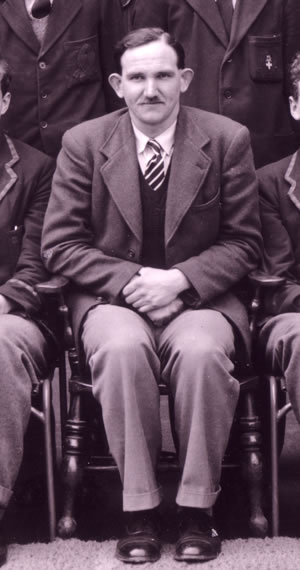 Harry Smith, affectionately known as ‘Brab’, was born in 1923 in Taunton, Somerset. His Grandfather was the pioneering founder of the Ramblers Autobus company which was to establish routes throughout the West Country. Harry’s father eventually took over the running of the company and they had sufficient means to send Harry to the well esteemed Taunton Public School. To this day, Harry can clearly remember the maths teacher, Mr John Evans, who was to have the strong influence on his life that Harry was himself going to eventually have on so many others.
Harry Smith, affectionately known as ‘Brab’, was born in 1923 in Taunton, Somerset. His Grandfather was the pioneering founder of the Ramblers Autobus company which was to establish routes throughout the West Country. Harry’s father eventually took over the running of the company and they had sufficient means to send Harry to the well esteemed Taunton Public School. To this day, Harry can clearly remember the maths teacher, Mr John Evans, who was to have the strong influence on his life that Harry was himself going to eventually have on so many others.
At the outset of the war, all of the company’s buses were ‘requisitioned’ for the war effort. In 1940, Harry had been due to commence at Bristol University but instead, found himself as a private soldier in the Gloucestershire regiment.
Harry still managed to complete some higher Maths education but in 1941 was transferred to the Royal Artillery and, with the 21st Anti-Tank Regiment, saw some very active service in North Africa and later in Italy. On one occasion, he was subject to such heavy bombardment that he suffered from shell-shock and was found with blood running from his ears. He was to lose most of the hearing on his left side which most Grammar School pupils would have been aware of but without due thought.
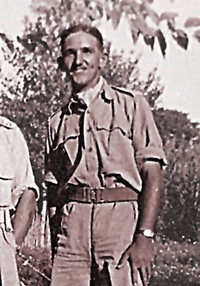 Towards the end of the war in 1945, Harry was made an Educational Officer and sent to Perugia College in Italy to re-educate troop in preparation for their return to normal life. By sheer co-incidence, he found himself teaching alongside his old Chemistry master from Taunton Public School.
Towards the end of the war in 1945, Harry was made an Educational Officer and sent to Perugia College in Italy to re-educate troop in preparation for their return to normal life. By sheer co-incidence, he found himself teaching alongside his old Chemistry master from Taunton Public School.
By now a Captain, he was later sent to Austria where he was involved with the re-alignment of National borders. Addressing locals in Austria, Harry asked for someone to translate. An attractive girl, Helen, was to reluctantly volunteer if he spoke slowly. Not long afterwards, she became his wife!
At the end of the war, Harry was deemed DOV (Deferred as Operationally Vital) and was prevented from returning home, missed his London University place. Taking a teaching certificate in the interim, he was somehow able to later catch up and complete the three year degree in two years.
Hearing about a post at Burton Grammar School from his lecturer in 1949, Harry applied and was appointed by the then headmaster at Bond Street Grammar School, Mr Moodey. His remit was not only to teach his main forte of mathematics, but to also teach Physics and Chemistry. Soon after starting, Harry also found himself in charge of School Rugby. This was in parallel to Norman Jones being in charge of Athletics. Victor Roebuck was soon to join the school as Head of Physical Education but, although also a keen rugby player, his weekend interests were with Burton Rugby club. He was also a Captain with the school’s Army Cadet Corps. along with Major D. Davies.
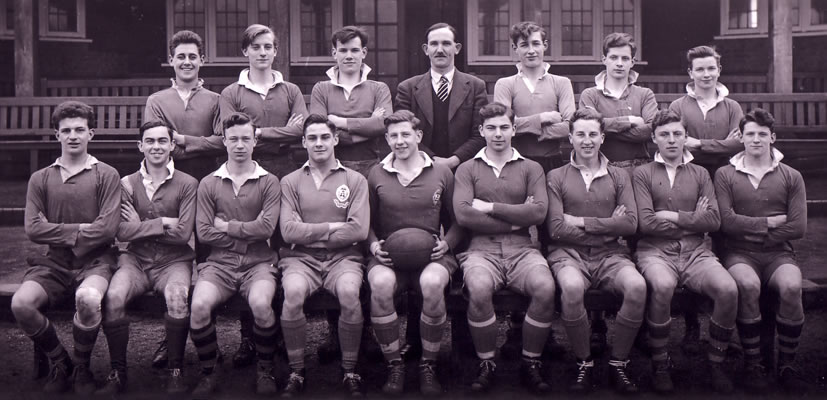 Harry put a great deal of time and effort into this and spent his Saturday mornings on the school rugby field. He was slightly perturbed to discover that Norman Jones received an additional allowance for his running of the Athletics whereas he received nothing. He took up the issue with the Headmaster, Mr Herbert (Horace) Pitchford, who had been appointed to replace Mr Moodey after is tragic recent death. Harry was declined which led to a feeling of resentment for which the school would pay dearly.
Harry put a great deal of time and effort into this and spent his Saturday mornings on the school rugby field. He was slightly perturbed to discover that Norman Jones received an additional allowance for his running of the Athletics whereas he received nothing. He took up the issue with the Headmaster, Mr Herbert (Horace) Pitchford, who had been appointed to replace Mr Moodey after is tragic recent death. Harry was declined which led to a feeling of resentment for which the school would pay dearly.
In 1953, disgruntled, Harry applied for a vacancy at Derby Technical College in the Department of Mathematics where he was enthusiastically appointed. Harry enjoyed his time there because, being a college of further education, there was a link to local industry which led him to involvement with ‘real world’ mathematical applications with companies such as Midland Rail and Rolls Royce, both based in Derby. He was to stay there for six years during which time, Bond Street School was closed to be replaced by the ‘new’ school in Winshill.
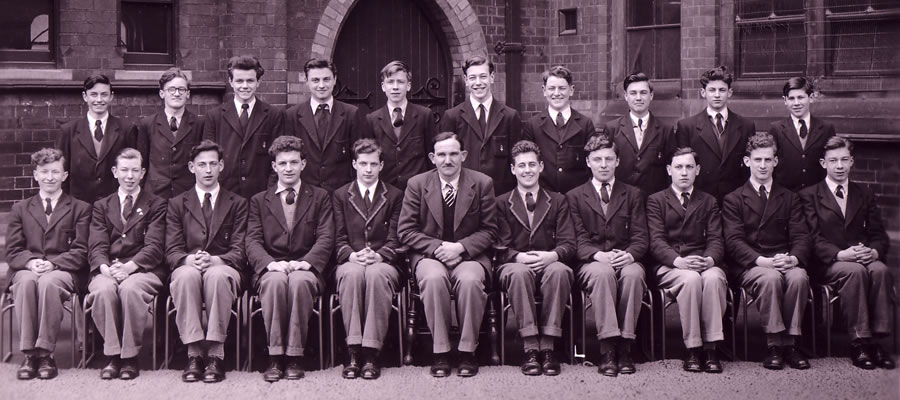 Shortly after the Winshill school was opened, William Gillion was appointed as Headmaster. Mr Gillion, himself a Cambridge Graduate of Mathematics, was a strong advocate of academic excellence and felt that the Mathematics Department at the school, then headed by George Cooper, did not offer provision for the most talented students. He was aware of Harry Smith and had received numerous accounts that he should never have been allowed to leave. So, in 1958, he wrote to Harry asking if we would consider taking over as Head of Mathematics and to run the Open Scholarships, which went beyond ‘A’ Level to prepare the most gifted students for places at Oxford, Cambridge and other Universities of Excellence.
Shortly after the Winshill school was opened, William Gillion was appointed as Headmaster. Mr Gillion, himself a Cambridge Graduate of Mathematics, was a strong advocate of academic excellence and felt that the Mathematics Department at the school, then headed by George Cooper, did not offer provision for the most talented students. He was aware of Harry Smith and had received numerous accounts that he should never have been allowed to leave. So, in 1958, he wrote to Harry asking if we would consider taking over as Head of Mathematics and to run the Open Scholarships, which went beyond ‘A’ Level to prepare the most gifted students for places at Oxford, Cambridge and other Universities of Excellence.
The latter proved sufficient enticement to attract Harry back so he took up the post; George Cooper was to retain a position as a Maths teacher as well as Deputy Headmaster.
Harry also worked for the Welsh Joint Education Committee for 40 years from 1957 during which time, he composed a new ‘Ordinary Alternative’ maths paper every year which was somewhere between ‘O’ level and ‘A’ level. This entailed several trips a year to Cardiff. He was thought of with some affection and on the occasion of him arriving there after 40 years service, they had prepared a special ‘maths’ cake with forty candles on.
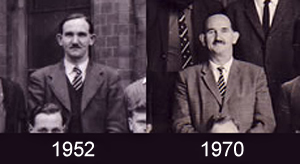 In 1960, Harry helped Bill Gillion to inaugurated a new form 5X to allow the most gifted pupils of form 3A to jump a year so that they would be able to study for Oxbridge entrance exams in their Upper Sixth without having to spend an addition year there. This proved to be tremendously successful and in their out-take year, the class achieved a record number of Oxbridge places, including Scholarships and Exhibitions, actually out-performing Repton Public School!
In 1960, Harry helped Bill Gillion to inaugurated a new form 5X to allow the most gifted pupils of form 3A to jump a year so that they would be able to study for Oxbridge entrance exams in their Upper Sixth without having to spend an addition year there. This proved to be tremendously successful and in their out-take year, the class achieved a record number of Oxbridge places, including Scholarships and Exhibitions, actually out-performing Repton Public School!
Sadly there was strong pressure, both internal and external, to look after the lesser able pupils rather than the brightest so the exercise was never repeated. Harry and other of the school’s most senior teachers saw this as the “start of the rot”.
With a degree of frustration, Harry continued at the Grammar School for a further eighteen years. During this time, he moved house from Scalpcliff Road to Repton and, co-incidentally bought the house from Mr Leech, headmaster of Dovecliff Grammar School and a good friend of William Gillion.
Very tragically, in 1971, his wife Helen, who taught German at the the Technical College and Girl’s High School, was killed in a car accident. He was to mourn for over seven years, unfairly blaming himself, before eventually meeting Diane Bates, an English teacher at the Girl’s High School in 1978 and she became his second wife.
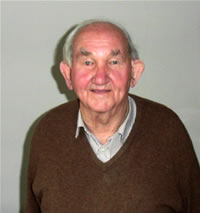 Harry’s time at the Grammar School also included the period where it was to be abolished in favour of becoming Abbot Beyne comprehensive school which led to much greater frustration. Harry himself sees this as “one of the greatest howlers the government has ever made”. His pleas for early retirement were declined so he was to continue at Abbot Beyne for a further three years by which time, he felt that we couldn’t have stood it for a moment longer.
Harry’s time at the Grammar School also included the period where it was to be abolished in favour of becoming Abbot Beyne comprehensive school which led to much greater frustration. Harry himself sees this as “one of the greatest howlers the government has ever made”. His pleas for early retirement were declined so he was to continue at Abbot Beyne for a further three years by which time, he felt that we couldn’t have stood it for a moment longer.
Harry’s son, Michael, was also educated at Burton Grammar School until 1969 went to Leeds University and is a very accomplished linguist.

